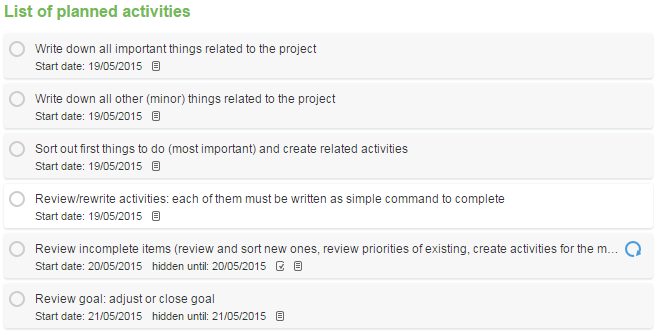Today we commonly feel the urge to move faster – take notice faster, learn faster, decide faster and act faster. It becomes a struggle. Still we can’t just decide: let’s be faster. There are situations, behaviors, previous experience and other things slowing us down. Let’s gather some analysis on what are the common situations asking for faster action, and what could be the simplest solutions at hand helping us find a way to move in a Fast Forward way – e.g., overcome inability to act because of the state of panic caused by pushing factors, such as your project schedule.
- a state or feeling of extreme fear that makes someone unable to act or think normally
- a situation that causes many people to become afraid and to rush to do something
It is typical to feel stress when working on a project, due to deadlines approaching and the overwhelming amount of work that still needs to be done. People react differently – sometimes they panic. It’s very much different than the fight for survival though, which may also cause stress and panic.
Before talking about handling stress and panic, let’s take a look at how it affects us.
Stress and panic are states created by our emotions. Strong emotions/excitement mobilizes abilities of our body, and until a certain moment this doesn’t limit our ability of rational thinking. Unfortunately though, after this specific moment we are quickly losing our ability to make rational decisions, and as a result our actions become impulsive, i.e. managed predominantly by our emotions. In case of some very strong emotions, especially if it’s not clear how to act – run or fight, we may stand still, as thinking is managed by emotions and we are not able to make any kind of decision. To make a complex decision we do need our rational part, but now it’s suppressed by our emotions.
There are many situations, when this is perfectly ok. Just one important precondition: our ability to act in specific situation should be working on the level of muscle memory – almost instinctively. Unfortunately, it’s not always the case.
It’s most certainly recommended never to get in a situation when you start losing ability to act. Plan and manage your life accordingly, in order to not let stress and panic in. Still in case it’s here, let’s see how to manage it. First of all, we need simple instruction and do simple things, since our brain is failing on complex ones right now.
Instruction for the state of stress/panic induced by project deadlines:
- Write down all important things that must be done (don’t estimate importance; simply keep acting)
- Write down all other things to be done, in a different list (otherwise your brain will try to run over and over again to look for important things that might still be missing)
- Sort out the first things to do (no more than 10!)
- Review/rewrite tasks: each of those must be written as a simple, straightforward command that can easily be completed (so that anyone competent enough would be able to get it done without rethinking what exactly to do now). Each of the tasks should be planned for no more than 30 minutes*
- Grab the first task and start doing (nothing happens by itself – sad, but true)
- While working on a task, write down every new task you remember in a third list. Don’t interrupt the task you are performing – make sure you complete it. Don’t switch to more any seemingly important task at hand. Stay focused on the one thing you are doing. After no more than 30 minutes you’ll get 1 thing done, even if 5 new have meanwhile appeared on the horizon. If, however, you will keep switching to new ones, then after 30 minutes you’ll probably get just 5 more incomplete tasks, without any task being actually completed. It would just contribute to you feeling even more stressed.
- Quickly sort out the new tasks - important or not. Adjust top 10 of the important ones.
- Repeat step 5 (and so on, and so on)
- At some moment you’ll find yourself feeling more relaxed. Amount of incomplete tasks is reducing; the list of things you’ve already done will show your progress. You are ready to regain control over the whole situation.
* There are exceptions, when a task does not fit in 30 minutes, of course. Still, you must remember – those are exceptions, and the right thing to do is to split such a task till each part is under half an hour.
To aid yourself with acting according to the process outlined above, you may even use a list of tasks/reminders– in the state of panic it’s most useful. Just try preparing a list of activities to be executed in such circumstances – be it on a piece of paper, or in some sort of electronic format, e.g.:
Electronic version provides with an even better opportunity to have it at hand all the time, and to plan ahead. In our company we use our own solution, Micromiles, with this ready-to-use template: “Stop panic caused by too much to do with project deadlines approaching”. You may as well setup a similar template in any other application.
Yes, it’s not going to help in all the possible situations. If the cause of the stress is not the amount of pending tasks itself, but an inappropriate amount of work for the available time and resources, then this may help you keep going, but will not do much in terms of reducing stress. Still, the idea of a top 10 task list is good and it helps! Reviewing your task list you may discover new or hidden tasks that you would have missed otherwise, i.e. the need to involve more people in the project, discuss adjustment of project schedule and/or scope. Either way, this simple process may help you get out of the situation where the emotional side of your brain is in control, thus becoming able to act rationally again.
If you have questions about the topic or would like to discuss case at hand – feel free to contact us!


